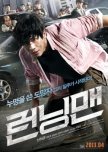
Something refreshing about this latest entry into the action genre must be its noticeable lack of shoot outs and martial arts. Our hero is no "Superman," lacking in most offensive skills; while his talents in escape are second to none, the limits of his body still check him. Jumping through glass storefronts is impossible for him, as is walking away unscathed from falls and hits. The damage steadily accumulates as the movie goes on.
Despite few surprises or shocking developments in the conflict, we're gifted with something unlooked for: a touching father-son relationship. This provides much welcome character development, adding another layer to the entire experience. Genuine humor also colors the script, with several laugh-out-loud moments strewn throughout.
Shin Ha Kyun slips right into the role of Cha Jong Woo, adopting his immature and crude persona seamlessly. Even his physical frame suits the character, as a former con-artist with a need for lithe and smooth movement. On another note (one that speaks to his dedication as an actor), Shin suffered rib fractures which he worked through for some time -- even continuing to do stunts. In the role of his son, we have Lee Min Ho. His Cha Gi Hyuk often served as straight man to slapstick or the foil to the flawed parent he must tolerate. Both of them took on more emotional scenes as well, performing believably apart and brilliantly together.
Fans of Special Affairs Team Ten (and its sequel) will instantly recognize Kim Sang Ho, still portraying a cop. His character seems tailor made for comedy as were his scenes; when paired with the actor playing Chief of Police, they were golden.
Many action films adopt simple soundtracks and Running Man continues the trend. At times, one might only hear natural sounds paired with silence; at others, suitable themes for mystery and brisk action. There are no songs here to add to playlists, but nothing to detract from enjoyment of the film either.
Vond je deze recentie nuttig?

My primary problem with the story is that, while highly informative and enlightening, some portions feel like a PSA. Marriage occasionally felt like it was all anyone cared about. On the other hand, a favorite aspect was the charming use of flower language to sum up the theme of each episode. It gave the drama something beautiful and unique.
Strong veteran actors make up the principle cast. Kanno Miho delights as Chiharu, portraying her with likability to spare. She seemed true to life, making human mistakes, suffering little moments of awkwardness, experiencing joys and hurts reasonably. And Kanno-san's smile! It's contagious. Ex-Takarasienne Amami Yuki can already do no wrong in my eyes, but she shone in Kekkon Shinai. As Haruko, she embodies every bit of strength, resolution, experience, and loneliness the character represents. Her work with Kanno-san basically defines chemistry. Last (but not least) we have wonderful Tamaki Hiroshi, the perfect male lead for a drama like this. His performance as the warm-hearted florist Junpei is understated but memorable.
The chosen music generally suits the drama well. Most themes were light and fun, but there were cloying melancholy pieces too. Scenes were well orchestrated, with marked silences for dramatic effect. One vocal stands out, the fitting and catchy Kami Hikouki by Kobukuro.
Vond je deze recentie nuttig?
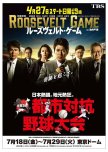
There are actually two story lines in Roosevelt Game: one concerning the ailing manufacturer Aoishima Seisakujo, the other its beloved but struggling promotional baseball team. Both are written solidly enough to stand alone, but complement each other so well why should one want them to? Together, these plots form an exciting masterpiece—though I avoid using that word if it can be helped. Often the events in one half relate to those in the other—but without the heavy-handedness this narrative device often carries. Some parallels are so subtle as to create a feeling of “Ah!” in the viewer when they are realized. And, as one might expect from the team behind Hanzawa Naoki, an overall atmosphere of intensity and forward motion permeates both elements—business and baseball alike. It has all the intrigue and heart-thumping one could wish; several times I found myself exclaiming aloud or nearly jumping upright, no exaggeration.
Because they share an author in Jun Ikeido and even directors, it is impossible to talk about this drama without referencing Hanzawa Naoki. But please, do yourself justice before coming in: don’t expect another Hanzawa Naoki, even though certain components may resemble that excellent series. Roosevelt Game, I felt, was actually an improvement on the model in many essential respects. For one, the human element was decidedly more powerful here—there were even brilliant touches of the life drama Japan so excels in. Thematic components found themselves better applied across the board, creating one solid arc rather than two. But perhaps most telling, Roosevelt Game concludes its 9-episode run satisfyingly self-contained and complete…with one less episode, and no need for continuance. As wonderful as Hanzawa Naoki was and still is (I’ve both marked highly), there’s no reason to allow it to overshadow this rare discovery in its impressive enormity.
I mentioned cinematography earlier; let me conjure it up again briefly. There are indisputable similarities to Hanzawa Naoki (again, same team); you've got the intense close-ups, dynamic angles, and unique shots. However, Roosevelt Game again sets itself apart with brighter lightning and softer colors. I also don’t believe another drama exists with such brilliant baseball footage! Though it isn't my favorite sport, I would be a liar if I said these games were not as exciting or remarkable as any action sequence in Asian television. If they used body doubles for the players, I definitely couldn't tell.
Speaking of players, what a uniformly talented cast! Enough are worth mentioning that I could write another few paragraphs on performances alone—but I won’t do that to you. Karasawa Toshiaki portrays President Hosokawa, an unpopular choice for this important seat; I am unfamiliar with him in a leading role, but he caught my eye right away. There is something of the tiger about him, his method is quiet and understated—but when he strikes, you know. Next is Kudo Asuka, another relatively new face to me and in actuality, as ace pitcher Okihara. A simple and sweet character, Kudo draws the viewer in with a mixture of gentle heroism and unassuming relatability. Be warned you may leave this drama affectionately referring to him as Oki. His wonderfully eccentric coach Daido is a scene-stealing gift via Tezuka Toru, while an executive officer occupies a similar space in the form of Sasai (a delightfully complex and stormy Eguchi Yosuke). So many more I’d love to mention, but please meet them in the drama instead!
For the lack of a more elegant term, the soundtrack is killer. The compositions, exquisitely arranged by Hattori Takayuki (Hanzawa Naoki, Shinsengumi!, Nodame Cantabile) are to absolutely to die for. I am not joking when I say that I've scrambled to find the Roosevelt Game soundtrack for purchase. Though almost entirely instrumental (with a few dramatic exceptions), the songs cannot be stopped from creeping into the brain. They are of an almost universally cinematic quality, from the stirring introduction and intrigue themes to anthems of crushing defeat and spirited victory. If you love string instruments, you’ll be in heaven especially.
One final warning: Roosevelt Game is frighteningly addictive. I finished the entire thing in one sitting—on a work night no less, and I almost want to watch it again right away. Take care when you start!
Vond je deze recentie nuttig?

A voice for the voiceless
An engrossing political thriller that manages a fine balance between human drama and suspense. Reflecting our world where it often seems as though corruption and misinformation are the order of the day, Shinbun Kisha lays out a David and Goliath tale of ordinary citizens standing against government corruption. While the inciting incident might seem small, that’s exactly what the drama tries to highlight; if society remains apathetic to the “small” corruptions, what will the powers that be try to get away with next? It also hits back against the pervasive thought that one person couldn’t possibly make a difference when it comes to political change. After all, we never know what our actions might inspire in others.Some may find early episodes slow, although I felt they did a good job establishing the broad strokes of the story and characters. In later episodes, however, there were some places where the story struggled to keep pace or stumbled over minutiae; the overall quality of the episodes was undiminished, but I sometimes wondered if a scene wouldn’t have been better placed elsewhere or even cut entirely. This was often the case with scenes that included Mayu, who could feel superfluous despite her early involvement in the development of another character.
That said, I found it difficult not to binge Shinbun Kisha. Since it often seems to mirror real life, the plot somehow appeals to the audience’s sense of justice. The characters are relatable for the same reason and win sympathy easily. Like any good story, Shinbun Kisha made me want to know more—but even beyond that, I needed to know if justice would actually be served. It was difficult not to get invested.
The camera is unobtrusive, yet still impactful. For example, during the press conferences where Yonekura Ryoko’s Matsuda is the only one brave enough to drill the administration for answers, she’s literally seated alone with a block of empty chairs surrounding her. Sickly greens and yellows are employed in sequences when corrupt dealings are underway, and chilly blues overlay rooms in which a character has been driven into a corner or frozen out.
Yonekura Ryoko and Go Ayano, perhaps unsurprisingly, are clear standouts in terms of performance. However, Yokohama Ryusei turns in a solid performance as an indifferent youth who slowly begins to understand the power that young people have in shaping the future of a country.
Recommended overall, especially if you like this genre. I'd love to see more like this from Netflix.
Vond je deze recentie nuttig?
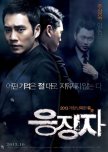
We start with a strong premise, and the initial twenty minutes are particularly promising. A good chunk of the emotional foundation is established after that point. From here, the story primarily deals with the troubled lead character and his actions once fate brings before his high school bully as an adult. What I enjoyed most about this film how human Joon Seok was; he was no mastermind or powerfully connected avenging knight. His pain was real and easy to connect with. There are also real instances of suspense, though mostly near the end; most of the intensity comes from the disturbing nature of the content.
Unfortunately, the middle sections of The Punisher are somewhat meandering and reliant on coincidence; certain events rely on the character knowing just how an event will play out. All but the lead actors play bare shadows. Several actors and actresses come and go in the narrative, serving more expositional purpose than anything else. As such, it’s hard to get a real feel for their talents, or even the real importance of their characters.
Joo Sang Wook often portrays dapper authoritarians, a fact he has frequently lamented in the media. Perhaps some of that irritation will now subside, because his Joon Seok is a wholly different animal. Of hollow eye and haunted expression, this character has barely held it together since his hellish teenage years. He is anything but suave here, barely recognizable; of particular note must be the scene in which Joon Seok first sees his tormentor again as an adult. The pure fear and honest trauma is just flooring. Our other lead, Yang Dong Geun, portrays the utterly despicable Chang Sik. Unfortunately, The Punisher marks the first time I've seen this actor; the frightening portrayal will not be soon forgotten.
A quick honorable mention to Kim Kwon as the young Joon Seok: he single-handedly set the atmosphere for the entire film with a nervous laugh. His is a career to watch.
While watching the music is noticeable, in a good way. Heart-thumping tracks, others which will keep the viewer on the edge of their seats, tragic and wordless vocals. My favorite is the ballad covering the credits; after the effects of the film, the results were chilling. Otherwise, nothing to add to the old MP3 player.
Vond je deze recentie nuttig?

The plot veered off tracks slightly past the halfway point. There's a decided shift in direction so noticeable that I'd thought the writers had changed hands. In truth, apparently internal politics at SETTV coupled with need to meet public demand caused this; either way it seems the writers clearly bit off a little more than they could chew. Character motivations became muddy; one promoted character totally vanished. Plot lines disappeared partway, then reappeared only to be wrapped up unsatisfactorily. Those that were necessary were often shuffled along in favor of trying to fix the problem of choosing the OTP, but even this was somewhat rushed.
What makes this unfortunate is that the main cast is so lovable. Nikki Hsieh has fine chemistry with everyone else in the drama, believably interacting with any character according to their intended relationship. She also does a great job in her dual role, because there are even speech differences between Da Hua and Liang Yan. James Wen is a personal favorite, but he was calling in all of his talent to keep his character from imploding. His Lin Guan Jun was handled poorly by the writers and his actions often made little sense in the final episodes. Wen has a natural charm about him though, so the eye is always drawn to him regardless.
Chris Wu is the favorite for most viewers, because he's such a talent; Terry could have reasonably been as interesting as cardboard. Instead, he's gorgeous, magnetic, compelling, and sympathetic; it's easy to see why he won the hearts of viewers so easily...and he's likely the primary reason many kept tuning in. I can't blame them.
My personal favorite part of Substitute Princess is the music. This is one of the OSTs I will be importing once it's available. Both the intro and outro suit the show unbelievably well, from the tone to lyrics. Each insert song is memorable and used effectively also. A special mention has to go to James Wen, who sang Guan Jun's love theme "Why Bother." Once when it played it got me teary-eyed due to its effective usage; it's such a beautiful song and his voice is quite pleasant.
Sadly, I can't think of any reason to re-watch this drama once you've completed it--unless you want to relive the experience that is Terry. I probably won't be coming back to it any time soon.
Vond je deze recentie nuttig?

What's better than having Won Bin star in a film? Having him perform alongside Shin Ha Kyun. The two are chameleon actors with a lot of chemistry (no doubt from previously working together on Guns and Talks); they really seemed like brothers despite looking nothing alike. Many viewers will relate to Won Bin's Jong Hyun, especially if they've ever felt their parent has played favorites. He's the more human of the two brothers, delinquent, rude, and jealous...but also loving and inwardly kind. It's a complex part that I lost Won Bin in; I totally forgot it was him for the longest time despite his unique look.
Shin Ha Kyun's Sung Hyun is something of a saint in comparison; he's sweet, smart, perpetually patient, the beloved son. Despite the fact this is also how Jong Hyun jealously sees him, Sung Hyun suffers a lot too. He was born with a harelip and never has an easy time of anything, even establishing a good relationship with his younger brother. Shin is fresh-faced and subtle here, a perfect foil to Won Bin's dynamic performance.
Unfortunately, My Brother will not be to everyone's tastes. The music was nothing special and, as mentioned before, the story is slow. So this is not a re-watch friendly movie; once you've seen it, there's nothing to go back for unless the interaction between the leads impressed you. The one time you do see it is definitely worth it though.
Vond je deze recentie nuttig?
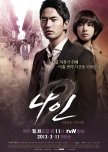
Nine: Nine Times Time Travel
23 mensen vonden deze beoordeling nuttig
Deze recentie kan spoilers bevatten
During the holiday weekend, I finally threw off my initial apprehensions and sat down with this drama. If I'm honest I expected to drop it after a few episodes. Despite the countless positive comments about Nine, I'm a long-term science fiction fan who has developed an unhappy wariness of the time travel plot device. How many times has it been used, especially in the west? And then even the best examples have glaring mistakes, including plot holes, missed details, bad science or ignored in-universe rules, etc. So imagine my elation when Nine skyrocketed beyond expectations and glued me to my seat for a two-night marathon.What makes Nine special is that it is careful with detail while maintaining a thrilling and unpredictable atmosphere. Apart from two instances, the first easily forgotten and the second clearly meant to be ambiguous, the drama unravels its mysteries with beautiful pace. With so much to explain, I almost expected loose ends; but every time I found myself questioning, I got a satisfying answer soon after. It's hard to go into much detail for fear of spoilers, but overall the writing is refreshingly strong and the usual mistakes of the genre are not present here. My only real issue in this department is that the first few episodes are somewhat slow to hook, despite being filmed in beautiful locations in Nepal and being integral to plot set up.
The best performance in Nine is hands down lead Lee Jin Wook. Without his natural charisma, Sun Woo might have collapsed into the arena of the two-dimensional. His performance hits every note and reaches ranges that include the sympathetic to the strong and sexy. He had me believing--which is everything you could want from an actor. I also spent a great deal of time marveling at how well everyone was cast in general though, especially when characters from the present started appearing in the sequences of the past. They'll have you swearing the casting department had a time machine of their own and just used younger versions of the leads!
Unfortunately, the weakest part of this drama is most definitely the music. Sometimes it's completely melodramatic and might remind older viewers of something straight out of the Twilight Zone. Most of the time, especially with the case of the insert vocal tracks, the songs are just not memorable. It's a shame, but I think with so much good going on elsewhere the OST can be forgiven.
Nine comes highly recommended, especially if you're looking for time travel done right. This is a drama which has a fast pace and mature, dark tone...so it's also perfect as high class palate cleanser after a long romantic comedy stint.
Vond je deze recentie nuttig?

What if I said Medical Top Team had a split personality? Several weeks ago, panicking network MBC announced a change in scriptwriters; whether or not a switch actually occurred is dubious. In any case, the focus and tone of the drama seemed to shift rapidly around the same time. What we began with was a somber medical offering, complete with meticulous operations and multitudes of jargon. Cases felt realistically engaging and hospital politics well-written and relevant. Character interaction possessed an understated, slow-burn potential, though most attention was paid to the overall workplace atmosphere. Viewers searching for something more technically sound, like me, would have enjoyed this to the end.
However, around midway, much more focus was placed on individual characters (including romances and personal drama). The result was a marked shift away from the surgical team element, which was sort of the entire point. Other stumblings include muddied simplification in hospital politics, plot-lines hastily handled, and character trajectory which sometimes felt pandering or out of line. Relationship evolution of and between certain characters became the worst offenders of this, especially within the last five episodes. Overall development was incredibly rushed, right up to the ending; little to no focus on romance suddenly becomes episodes without scalpels, but stuffed full of sudden hugs and almost-kisses.
Performances suffer inconsistencies as well, stemming from both issues with the script and fizzling chemistry between actors. This comes from a person with many favorites present in the cast.
For instance, Jung Ryeo Won plays a role lacking in everything from settled back story to likability; her presence can only be called wooden, which is *not* the standard for this talented actress. What worsens the effect is how little spark exists between her and either male lead, though particularly Joo Ji Hoon. Zero chemistry, there, platonic and otherwise. But on that note, Joo Ji Hoon manages to have the best portrayal and most consistent character in the series. Late episodes allowed him to show more range and were very kind to him, though the styling department never was. His work with Kwon Sang Woo (whom I found likable) and Jun Noh Min (twice now, after Five Fingers) was strangely fun to watch. Favorable mentions go to Alex Chu and Park Won Sang, while the huge amount of airtime enjoyed by Oh Yeon Seo will forever have me scratching my head. Her acting wasn't great though she very nearly eclipsed Jung Ryeo Won as female lead, a disappointment of itself: Dr. Seo needed the extra time.
Fine music stands tall as the best element throughout Medical Top Team. Most instrumentals are memorable and suit each situation well. There are also two very nice vocal pieces including the stirring "Firelight," (John Park) and catchy number "Can You Feel Me?" (Melody Day). Other positive highlights include an actual, modern hospital used in filming, deliciously bright color palettes used for sets and clothing, and sharp cinematography.
Vond je deze recentie nuttig?
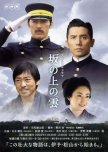
Each episode of Saka no Ue no Kumo (“Clouds Above the Slope”) opens with these optimistic words. An NHK special, this high-budget historical spans a period during the Meiji era which includes the Sino-Japanese and Russo-Japanese wars. But despite a clear aim to educate and remind viewers such events ever took place, imparting the spirit of the times to viewers holds chief importance. One learns what the Japanese people felt at the time: a reluctant deference to western knowledge and shame at requiring it, national pride and burgeoning hope, the excitement and fear which accompanies the dawn of a new era.
We follow the stories of three historical figures, brothers Akiyama Yoshifuru (cavalry legend) and Akiyama Saneyuki (maritime hero), as well as their childhood friend Masaoka Shiki (writer and pioneer of the haiku). The three grew up together in the same small town of Matsuyama, yet matured into men whose unique talents would help raise their country in the eyes of the world. Saka no Ue no Kumo utilizes their unique perspectives to tell the story of Japan in its infancy as a modernizing country, while also touching on these incredible lives. Most of the political and military history comes to us via the brothers and their contemporaries, while art and culture channel through the eyes of the writer alone. Viewers may be surprised to see how many international figures and events influenced Japan at this time. An important name includes Czar Nicholas II (the last Romanov and father to that poor Anastasia so many of us have been acquainted with thanks to apocryphal relations).
What an ambitious objective! Unfortunately, it is an objective that goes unmet in some areas—despite valiant effort. One issue is that this drama attempts to tell too many individual stories at once; so much focus ought to be put on the Akiyama brothers (and is), and as a result other plotlines seem to interrupt the narrative flow. One major example is that of Masaoka Shiki. Despite his status as a literary legend and particular childhood friend of Akiyama Saneyuki, I felt there was very little the writers could tell us through him. He may have been better served as a supporting character, especially since his presence so rarely had an impact on the others past a certain point. When humor was injected into the series, it was often done in an almost awkwardly goofy way which did not suit the somewhat austere tone. Otherwise the plot is as strong as to be expected from any mile-stone celebrating special from the NHK. The fascinating subject matter often speaks for itself, with little pressing need for overt embellishment. Please be warned, however, that there is a definite pro-Japanese spin to most depictions.
Military buffs ought to be pleased with the major battle sequences. Despite occasionally being a touch short, choreography and quality CG are used in concert to create a realistic effect. It surprised me how well done this aspect was, especially for television.
When names like Abe Hiroshi, Kagawa Teruyuki, and Kanno Miho grace a cast listing, one instantly expects quality performances. For the most part, viewers shall not be disappointed in such expectations. Abe Hiroshi meets his usual standard with masterful poise, emerging as the ramrod strict (though oddly warm) Akiyama Yoshifuru. I was particularly impressed with his portrayal during war-time and wondered how much equestrian training he might have acquired. Motoki Masahiro is a name not immediately mentioned above, but perhaps my absolute favorite actor in Saka no Ue no Kumo. Naval history has always been a personal favorite topic of mine, so naturally I gravitated more toward Akiyama Saneyuki. Despite this early bias, I also luckily met an actor with natural charisma and an almost chameleon skin. In early scenes, Motoki-san portrays a wild and strong-willed youth whose intelligence is being wasted in Matsuyama; as the drama continues, we witness changes responsibility, command, and war effect in this boisterous personality.
On the other hand, we have the ever-talented Kagawa Teruyuki—who seems to have been miscast as Masaoka Shiki. The younger years were hard on Kagawa-san, who neither looked especially young nor performed as such without a great deal of exaggeration. In the second half of the series, once the character settles, viewers are finally treated to the acting skills Kagawa-san is so beloved for. A minor note: much of the western cast were dreadfully hammy, or wield their “native languages” less than fluently. This can be quite distracting at times, considering how important many of the international figures are to the story.
Saka no Ue no Kumo can pride itself on the strength of its soundtrack. Legendary composer Joe Hisashi contributed his talents to this portion of the drama, and it shows. The main theme of the series overflows with the kind of hope and strength this series tries so hard to capture. A personal favorite track must be Stand Alone, vocalized in angelic tones by Sarah Brightman (of The Phantom of the Opera fame).
Vond je deze recentie nuttig?
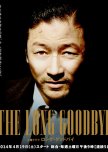
The Long Goodbye covers just one case in full, taking place in the early 1950’s. We swap the original location of Los Angeles in the United States for Japan in the same era. This injection of the downtrodden post-war atmosphere throws its shades on the theme and plot. What results is a wholly unique spin on a drama otherwise reminiscent of classic detective noirs popular so long ago in Hollywood. “Shiritsu tantai (private detective)” Masuzawa Banji replaces iconic Phillip Marlowe in this short and sweet adaptation; just like Marlowe did, Masuzawa encounters an unforgettable friend he feels he must protect—then eventually vindicate in the eyes of the public. Our mystery is one fraught with murder, twisted love, and poisonous wealth, filled to the brim with refreshing twists and turns, strewn with clues for the viewer to notice. Nothing is what it seems, and most things are more complicated than first glance.
Something else of note is the excellent narrator, doubtlessly kept over from the source material: he has a wonderfully cheeky style, and often brings much-needed humor to The Long Goodbye when heard.
Asano Tadanobu is a consummate actor, best known for his excellent work in film. Being able to see him on screen for any extended amount of time has been a rare pleasure. As Masuzawa, Asano-san brings an excellent physical performance to the table, using body language to tell what the character cannot. He is a silent type as these detectives tend to be, yet also displays a wonderfully amusing attitude from time to type. Whenever Masuzawa would become fed up with a situation, that scene was golden. Other honorable mentions go to Kato Koyuki, our resident sultry enigma played with style and pathos, and Ayano Go as friend-in-need Tamotsu. His tears won’t soon be forgotten; what a wonderful display of vulnerability in such a relatively short appearance.
Musically, The Long Goodbye offers nothing I would listen to again. But for its purpose, building the atmosphere and tone of the drama, it’s perfect. Like the narrative style and cinematography, a classic approach is taken with the soundtrack. Everything gushes with dark, jazzy color—just like an old-timey film. Of everything one can hear in this drama, the theme song will be most memorable. As I type this out, I can still hear it playing in the back of my mind.
Vond je deze recentie nuttig?

Kamo, Kyoto e Iku (Kamo Goes to Kyoto) belongs to an unusual subset of dramas. While a plot exists and the story is passably well-told, everything ends up feeling rather educational. We see the beautiful city of Kyoto, complete with its landmarks and various traditions. We see how the ryokan is run, right down to maid etiquette, ofuro cleaning, and the composition of kaiseki (traditional Japanese cuisine, a staple of these establishments). This aspect is much stronger than the script itself, though even that remains enjoyable if somewhat simple. And if you like themes of modernity vs. tradition, you may discover another layer of appeal.
Should you actively seek out knock-out performances, continue your search; this drama will not offer them. However, nobody does a poor job either; most characters are pleasant and, at the very least, reasonably acted. Matsushima Nao might be most memorable, headlining as Ueba Kamo: seasoned finance official and Kyoto anti-fan (she even hates her name, originating from the famous river which runs through that city). Her elitist portrayal is believable, as it is when she switches gears. The exploits of this character lead us through the events of the drama, and the operations of the ryokan itself. Though she also has a cute side, mostly shown through her morning exercise routine.
Music follows a similar tack as acting. Everything is suitable and works in most scenes, but very little stands out. However, Sheena Ringo provides the striking vocal theme ("Iroha ni hoheto" or "Even Blossoming Flowers") definitely worth listening to again.
I would mostly recommend this drama to Kyoto-lovers, or those seeking cultural enrichment. Coming into this drama for other reasons might lead to a lukewarm experience. Don't be discouraged though! Kamo, Kyoto e Iku might have a lot to offer potential viewers of any kind.
Vond je deze recentie nuttig?
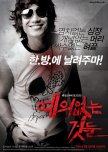
Much of the appeal can be attributed to Shin Ha Kyun himself; his "Killer" is a mute who only communicates physically with other characters and through internal monologue with the audience. It's amazing how much he's able to convey with just body language and facial expressions! In particular, there's a scene with the female lead where you could tell exactly what he was thinking...just by a few subtle physical cues. His narration is also incredibly charming and often hilarious. Another interesting character is played by Kim Min Joon: an ex-ballet dancer with a philosophical heart...and wicked knife skills. "Ballet" had the best action sequences in the film as well, since he incorporated his dancing into his battle style. It's too bad there weren't more of them; while Shin Ha Kyun did a great job on his own fight sequences, they weren't nearly as compelling.
On the story front, all is generally solid. It's unremarkable aside from the characters, quirks, and instances of strangeness... but these are enough to keep it all afloat. The comedy even works well and generates genuine laughs. A specific grace this film has is its ending, however; it is a satisfying, though bittersweet, conclusion that works great with the rest of the story.
Honestly if you can find it, give it a try. No Mercy For The Rude should keep you entertained for a few hours at least. Just be careful if you're weak with blood, because there's a decent amount!
Vond je deze recentie nuttig?

Love Will Tear Us Apart
15 mensen vonden deze beoordeling nuttig
Love Will Tear Us Apart, as you may have garnered, takes a more realistic approach to romance. Shirking the wild pattern of outward conflict, it favors internal failings instead (such as insecurity and thoughtlessness). We see the start of the relationship only briefly, spending most of the film after Liang Liang and Miao Miao are established as a couple. For those that find worry in this, have no fear; we step into their lives as strangers, just as they do with one another, slowly becoming comfortable as they do. The story motion, though somewhat unconventional at times, eventually lends the impression of a real couple. Overall, most aspects felt natural and modern, so viewers may even see uncanny wisps of their own relationships (past and present).
What I enjoyed most about this film was the evolution of its tone throughout. Despite bearing a dismal title, Love Will Tear Us Apart actually kicks off surprisingly cute and funny. Many scenes with the leads are especially so, having been built to make invest one in the love story. But things become heavier gradually as the plot rolls along, and the viewer (though still rooting for both parties) starts to see undeniable cracks in this relationship. Something about the atmosphere just works and (if empathetic like me) one may come away feeling as though one had lived through all the love and pain themselves.
Both halves of the couple perform well, exhibiting vibrant chemistry.
As the charming (if somewhat typical) Liang Liang, Feng Shao Feng retains every drop of his amazing screen presence. His expressive eyes lend much to his performance; every emotion is lent credence, and one can almost see what Liang Liang is thinking. Despite the fact this character can be somewhat careless, it's almost impossible not to like and understand him. Playing adorable yet insecure Miao Miao, we have Ni Ni as his lover. Her performance is strong in the same ways as her co-star, but I must applaud the natural and interesting motions she adopted. Caring about Miao Miao was a must, though her behavior cannot always be condoned.
For cinematography lovers, shots are clean and clear. Many take on the feeling of an independent film, with occasionally artful choices. Some sequences even stand out, such as two parallels (you'll know when you see them); otherwise, though, nothing is terribly innovative. I did appreciate the color palettes though, especially in darker scenes. Music is similarly suitable, though without much in the way of tremendous memorability. Tracks for pivotal scenes were rather good, that said.
Vond je deze recentie nuttig?

Three strangers, alienated by society in some way, enter into a love triangle. Share House spins this tried and true formula, having a male lead fancy the other -- instead of the main female. This aspect initially intrigues, but loses charm by the halfway point. Despite some chemistry existing in all directions, none of the possible love lines are handled well. Where romantic feelings exist, they appear to have done so strongly from first sight. We never see "falling in love", and no tension is created by the triangle. A second triangle (comprised of seriously underdeveloped supporting characters) could have been cut without repercussion.
The other theme, alienation, fares somewhat better. I will refrain from making a joke about extraterrestrials now, since there are enough in the drama.
Only one character worked for me (Sakurai), with the other two being snooze-worthy (Shio) or out of this world (Teppei). Sakurai, almost feline and seriously aloof, was easiest to like and sympathize with. His story rang true and actually had me feeling for him. On top of that, the comedic aspect of his character worked most consistently; Tanihara Shosuke has amazing comedic timing. Oizumi Yo does as well and is generally wonderful on screen. It's just the script spent too much time wringing laughs out of his character that weren't there.
Little impression was made by the music, though the vocal by ayaka is noteworthy. It plays at the beginning of each episode, accompanied by a neat intro sequence.
Vond je deze recentie nuttig?






















